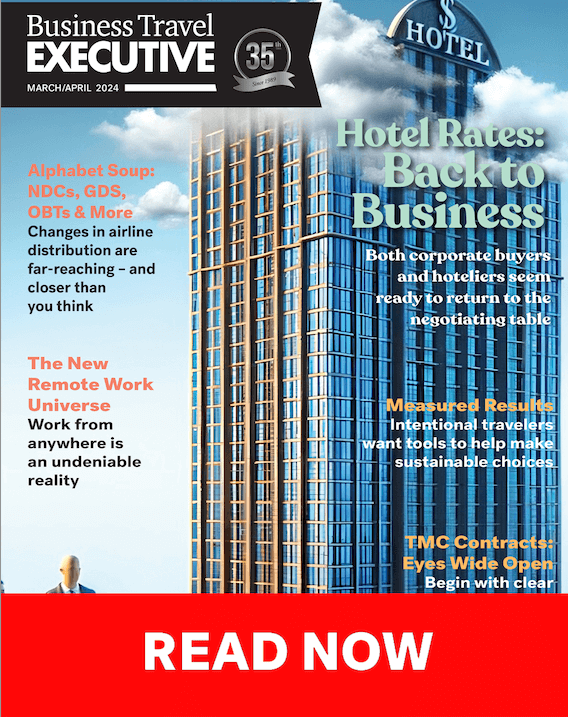Unable to beat them, most brand groups have decided to join the independents – usually defined simply as independently owned and operated hotels without a brand affiliation – by forming “soft brands,” collections of non-branded properties under a brand umbrella.
For their part, travel managers are seeing an opportunity with this development both to please travelers who are seeking different kinds of lodging experiences, and at the same time meeting travel policy requirements – while the soft brands are working with them to enable those goals.
The strength of independents and the growth of soft brands reflect an increasing desire for lifestyle hotels – properties that offer a distinctive design, authenticity or local feel, and an “unscripted” approach to service – all counterpoints to branded lodging that travelers may find consistent on the one hand, but many see as “cookie cutter” on the other.

As the Highland Group, a consultancy, showed in its annual Boutique Hotel Report, lifestyle, soft-branded hotels and independent boutique hotels together generated more than $15 billion in revenue in 2016 in the US. Moreover, each of those categories have reported annual revenue per available room that exceed averages for the industry overall.
Today, Marriott operates Autograph and Tribute; Hilton has Curio by Hilton and Tapestry by Hilton; Choice has Ascend; and there are multiple other collections. While allowed to operate as they always have, these hotels get to take advantage of the big brands’ marketing and loyalty initiatives.
While they are still relatively new, soft brands have grown rapidly. Examples: BW Premier Collection, launched only two years ago by Best Western, has already grown to over 75 locations worldwide. And Ascend Hotels from Choice Hotels, has more than 170 locations around the world, also a dizzying rate of growth for a relatively new brand.
And while brands have had difficulty planting their flags outside the US because of a stronger tradition of independence, soft brands seem to have a better shot at staking that claim. “We are seeing (the dominance of independents) change,” according to Brian Povinelli, global brand leader for Marriott's Distinctive Premium Portfolio, which oversees Autograph, Tribute, Design Hotels and others. “We have 15 Autographs outside North America,“ he notes.
Independent Thinkers
Soft brands and even true independents can make it easier for travel managers to work with them. “If a company is very restrictive in its travel policy,” says Gary Isenberg, president of LWHA Asset Management Services, “they might benefit from using a soft brand because they meet the requirements in the same way as branded hotels.”
According to Lukasz Dabrowski, senior vice president of hotel solutions at the hotel booking portal HRS, his company works with 350,000 properties, over two thirds of which are independents. HRS has 40,000 corporate accounts worldwide. Dabrowski adds that HRS is proactively managing 3,000 of those accounts
“In some places the independent hotel world has been unattainable to travel managers,” he explains. “If they are going to build a program, they need an expert to work with them. That means a format that is convenient and familiar to them, and that will result in traveler satisfaction,” Dabrowski explains.
“Travelers today expect huge diversity in their hotel choices, options that are outside their regular scope, hotels that are not chain affiliated.” As a result, he says, HRS pushes independents to make themselves available on all booking channels and to “work with the corporate compliance process, how they are served up to bookers and travelers.”
Marwan Batrouin, senior director and hotel practice area leader at BCD Travel’s consulting group Advito, says, “The rise in soft brands, boutique hotels and independent hotels has been a natural fit to managed travel hotel programs in recent years. Along with average increases in rates in most regions and especially in primary markets, travel managers have been on the lookout for new lodging options for their travelers.”
There are two reasons for this trend, says Batrouin. “First, moving market share for a better rate has been a successful strategy for most well-managed hotel programs. With rates on the rise, new soft-brand hotels have been attracting corporate clients by pricing themselves competitively relative to other brands in their cluster. Travel managers are willing to move market share to a new property as a cost-saving measure, if it fits within their hotel program criteria and overall strategy.”
The second reason, says Batrouin, “is to offer a variety of options to travelers, especially younger travelers, who want the best of both worlds while on the road – a non-traditional and new experience, as well as the benefits of loyalty programs. Having soft-brands and other non-traditional options in a managed program allows managers to keep younger travelers engaged and compliant to preferred suppliers.”
Povinelli advises travel managers to “go in knowing an independent hotel will not be as predictable as a Sheraton or Marriott.” However, he notes, “the hotel will deliver on personality, service, quality and duty of care.”
Travel managers, says Dabrowski, “need to be able to quickly understand a product and rate. With all the consolidation going on in the industry, chains have increased negotiating power and independent hotels have come under a lot of pressure so they try harder in every aspect,” including what he calls “special programs exclusively for the corporate community. These offerings operate like a closed shop with information that is not visible on public sites.”
Soft brands and collections are offering tools to help travel managers find greater cost savings and more options. For example, according to Kimberly Wilson, vice president of global sales North America for Preferred Hotels & Resort, “We recently launched a program for corporate clients seeking competitive best available rates and value-added amenities such as complimentary Internet access and iPrefer points,” Preferred’s loyalty program.
Dorothy Dowling, CMO at Best Western, explains, “Often, soft brands are indicated in the GDS under the brand’s master chain rate access code to allow agencies to best see the relationship between the master brand and their subset of brands. Within RFP tools, the brands affiliate the soft brands with their master brand so when a travel manager requests a hotel to be included in their RFP, that request is sent to the master brand to facilitate.”
Dowling goes on to note the additional benefits for travel managers working with the master brand’s sales organizations to help educate business travelers. “Having the sourcing competency through the master brand/company assisting the travel managers with procurement needs means travel managers have a trusted source to help them navigate sourcing with a single-stop shop sourcing partnership through their brand sales manager.”
Mark Nogal, global head for both Curio Collection by Hilton and Tapestry Collection by Hilton, notes, “Some travel managers may be understandably wary of incorporating independent hotels into their travel policies. However, those independent hotels that are affiliated with a hotel chain meet or exceed their guidelines for service quality.”
According to Diane Hamey, senior hotel account manager for Creative Lodging Solutions, a TMC, “We do partner with soft brands. Our selection of hotel options for our clients is based on each company’s travel policy and their needs for a specific stay. So we may provide options for soft brands when they fall within the client’s rate guidelines and are in the area needed.”
A Demand for Something Different
The success of soft brands is a tribute to the special nature of many independent hotels – the fact that each is different and memorable in some way. Povinelli says, “Although hotels in all these collections operate under the Marriott umbrella, we are not dictating things like the kind of beds or amenities or programming.”
Janis Cannon, senior vice president-upscale brands for Ascend Hotels, says member properties “are not dictated to on how to look, feel or operate.” Instead, membership “enables hoteliers to maintain their local identity and individuality, to keep doing what they do best – which is delivering an exceptional, authentic guest experience.”
For Marriott, the goal is to use the power of its 30 brands (since the takeover of Starwood) to appeal to every traveler, even those who would not want to stay in a classic brand like Marriott or Sheraton, which Marriott also operates. “We believe,” says Povinelli, “that we can offer then any type of experience at a price or value that fulfills their 360-degree needs.”
Despite the current dominance of independents outside the US, the emergence of soft brands and collections means companies with significant resources can make the case for joining them. Wilson says international markets present considerable potential for growth with independent brands.
“In fact, last year, we celebrated our first-time presence in Sweden, Norway, Bahrain, Saudi Arabia and Qatar; and have already signed 32 independent hotels in 2017, with most of those located in independent markets such as Greece, Turkey, Scotland, South Korea and the Maldives.”
Ron Pohl, COO of Best Western, says, “We recently announced our first new-build BW Premier Collection property in Asia with the signing of BluPhere Pattaya in Na Jomtien in Thailand.” The brand has also announced its first property in Japan, and additional properties in Mexico, France and Canada.
Curio is adding hotels this year in London, Paris, Rome, Iceland, Latin America and South China. “In fact,” says Nogal, “approximately 43 percent of our openings this year are outside of the US.”
The Word From Member Hotels
Hotels often deal individually with travel managers and have their own point of view about belonging to a soft brand. Jeff Miller, director of sales and marketing at The Highland Dallas, a member of Hilton’s Curio group, says, “Having the brand recognition that comes with being part of Hilton has benefits relating to business travel, especially thanks to the Hilton Honors program.”
The Duniway is a new hotel in Portland, OR, that operates under the Hilton umbrella. “The beauty of a soft brand/collection is that their association to a larger group is not apparent to the individual traveler,” according to Ava Setzer, senior sales manager. “What that brand assures the traveler and the travel manager, however, is that the quality in product and service is consistent and provides a foundation for the hotel experience.”
A hotel like The Duniway is “completely not reliant on the brand, and the end result provides the customer an authentic and unique experience unfettered by a brand’s desire to keep consistent,” says Setzer. “Large brands spend so much time ensuring consistency from property to property that they lose the opportunity to create something that feels authentic to their destination and culture.”
Both independent hotels and collections seem to have staying power. For business travelers and travel managers, a soft brand does not require a hard sell.









